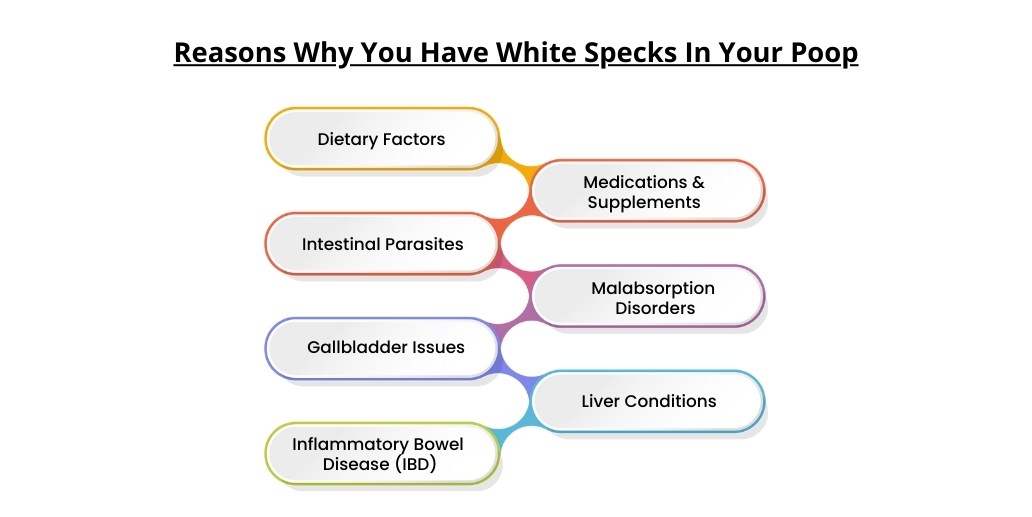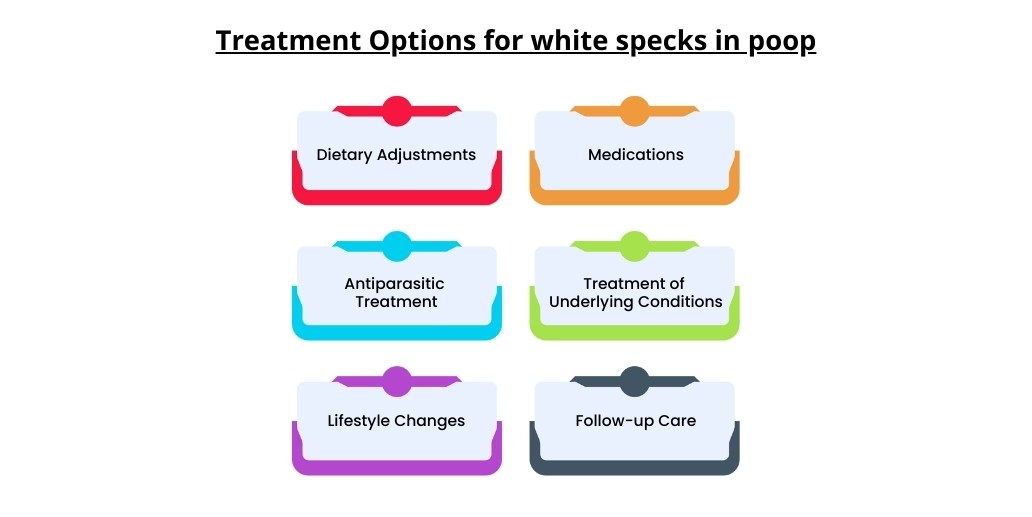White specks in stool can be a concerning discovery for many individuals, prompting questions about their origins and potential implications. These specks are often attributed to a variety of factors, ranging from dietary habits to underlying health conditions.
Research suggests that common causes include undigested food particles, particularly those high in fiber or fat, which may appear as small white spots in stool. While encountering white specks can be alarming, especially when accompanied by other symptoms such as abdominal pain or changes in bowel habits, they are not necessarily indicative of a serious health issue on their own.
Understanding the triggers and treatment options associated with white specks in stool can provide clarity and peace of mind for those experiencing this phenomenon.
Are White Specks in Stool Normal?
Many people wonder about this when they notice unusual features in their stool. In most cases, seeing white specks or dots in stool is not uncommon and often reflects harmless factors such as undigested food particles like seeds or grains. These specks can also result from changes in diet, especially after consuming foods rich in insoluble fiber or high-fat content.
While occasional white specks are generally benign, persistent or accompanying symptoms like diarrhea, abdominal pain, or changes in stool color may warrant a visit to a healthcare provider for further evaluation.
Symptoms of White Spots in Stool
Symptoms of white spots in stool can vary widely, often depending on their underlying causes. One common indicator is the presence of small, whitish-yellowish tissue-like balls or seed-like particles, which may be visible in the stool.
Additionally, stool may have a white-speckled appearance or a white mucous coating on its surface. In some cases, the presence of small parasites, such as tapeworm segments, can also manifest as white spots in stool.
A notable symptom often associated with these conditions is foul-smelling stool, which can accompany gastrointestinal disturbances.
Foul smelling stool: Stool may emit an unusually strong or foul odor, often more pungent than usual bowel movements.
Whitish-yellowish tissue-like balls: These can appear as small, round masses resembling tissue or clumps in the stool, often white or yellowish in color.
White specks appearance: Visible as tiny, pinpoint white spots scattered throughout the stool, resembling grains or small particles.
White mucous coating: The stool may exhibit a slimy or mucous-like white coating on its surface, which can indicate an inflammatory or infectious process in the digestive tract.
Presence of small parasites (e.g., tapeworm segments): Sometimes, white spots in stool can be segments of tapeworms or other parasites, visible to the naked eye.
Presence of undigested seeds: Seeds from fruits, vegetables, or grains that are not fully digested can appear as white spots or specks in stool, especially if the diet is high in fiber.
What Causes Large White Balls in Stools?
What causes large white balls in stools can vary based on several factors. One common reason is undigested food particles, particularly those high in insoluble fiber or fat content. These can appear as larger, whitish-yellowish tissue-like balls in the stool.
Another possible cause is the presence of intestinal parasites, such as tapeworms, where segments shed from the parasite can resemble white balls in the stool. In some cases, medications or supplements that are not fully absorbed by the body can also pass through the digestive system and present as white masses in the stool.
Understanding the underlying causes of large white balls in stools can help determine whether further evaluation or treatment is necessary.
8 Reasons Why You Have White Specks In Your Poop

Dietary Factors
Dietary choices heavily influence the appearance of white specks in stool. Foods rich in insoluble fiber, like seeds, nuts, and certain vegetables, often pass through the digestive system relatively intact, appearing as white spots in the stool.
Medications and Supplements
Certain medications and supplements can contribute to the presence of white specks in stool. For instance, antacids containing calcium carbonate or iron supplements can appear as undigested particles, altering stool appearance.
Intestinal Parasites
Infections by intestinal parasites, such as tapeworms, can lead to the presence of white specks in stool. These parasites shed segments that resemble small white grains or rice-like particles in the feces.
Malabsorption Disorders
Conditions that interfere with nutrient absorption, such as celiac disease, where gluten damages the intestines, or lactose intolerance, which affects lactose digestion, can cause changes in stool consistency and appearance, including white specks.
Gallbladder Issues
Gallbladder problems, such as gallstones or inflammation, can disrupt bile production and flow. This can result in poor fat digestion and absorption, leading to fatty stools that may contain white spots.
Liver Conditions
Liver diseases, like hepatitis or cirrhosis, can affect bile production and flow, influencing stool color and composition. This can occasionally manifest as white specks in the stool due to disrupted fat digestion.
Inflammatory Bowel Disease (IBD)
Chronic inflammatory conditions such as Crohn’s disease or ulcerative colitis can cause inflammation and ulceration in the digestive tract. These conditions impair nutrient absorption and digestion, potentially leading to changes in stool appearance, including white specks.
Treatment Options for white specks in poop

Consulting with a healthcare professional is crucial to determine the most appropriate course of action based on individual circumstances.
Dietary Adjustments: Modify your diet to include more soluble fiber and avoid foods that are difficult to digest.
Medications: Depending on the cause, medications may be prescribed to treat infections, manage digestive disorders, or aid in nutrient absorption.
Antiparasitic Treatment: If intestinal parasites are identified, specific medications to eliminate the parasites may be prescribed.
Treatment of Underlying Conditions: Addressing conditions such as celiac disease, gallbladder issues, or liver disorders with appropriate medical management.
Lifestyle Changes: Incorporate lifestyle adjustments such as stress management techniques or regular physical activity to support digestive health.
Follow-up Care: Regular monitoring and follow-up with healthcare providers to assess treatment effectiveness and make adjustments as needed.
Other Tips for Good Gut Health
Maintaining good gut health goes beyond treating immediate symptoms like white specks in stool. Incorporating these practices into your daily routine can promote overall digestive wellness and support long-term gastrointestinal health.
Eat more plants: Incorporate a variety of fruits, vegetables, whole grains, and legumes into your diet to provide fiber, antioxidants, and essential nutrients that support a healthy gut microbiome.
Eat fermented foods: Include probiotic-rich foods like yogurt, kefir, sauerkraut, and kimchi, which contain beneficial bacteria that can enhance digestion and immune function.
Manage stress: Chronic stress can impact digestion and gut health. Practice stress-reducing techniques such as mindfulness, meditation, or regular exercise to promote a balanced gut-brain connection.
Get more sleep: Quality sleep is essential for overall health, including proper digestion and immune function. Aim for 7-9 hours of sleep per night to support optimal gut health.
Don’t overuse antibiotics: Antibiotics can disrupt the balance of beneficial bacteria in the gut. Use antibiotics only when necessary and as prescribed by your healthcare provider to minimize their impact on gut health.
Avoid smoking: Smoking has been linked to various digestive disorders and can impair gut function. Quitting smoking or avoiding exposure to tobacco smoke can benefit overall gut health.
What Causes White Specks in Toddler Poop?
In toddlers, white specks or spots in stool can often be attributed to dietary factors. These may include consuming foods high in insoluble fiber, like seeds or certain vegetables, which can pass through the digestive system largely undigested.
Additionally, changes in diet or the introduction of new foods can lead to variations in stool appearance. However, it’s essential for parents to monitor their child’s symptoms closely, as white specks can also indicate other issues, such as intestinal infections or, in rare cases, underlying medical conditions.
Consulting a pediatrician is recommended to determine the exact cause and ensure appropriate management if needed.
When to See a Doctor?
While occasional white specks can often be harmless and related to dietary factors, certain signs and symptoms warrant medical attention. It’s advisable to consult a healthcare provider if you notice persistent or severe white specks in your stool, especially if accompanied by other symptoms such as abdominal pain, changes in bowel habits, persistent diarrhea or constipation, fever, unexplained weight loss, or visible blood in the stool.
Additionally, if you have a history of gastrointestinal disorders or are concerned about your digestive health, seeking medical advice can provide peace of mind and ensure any underlying conditions are promptly addressed.
Early evaluation and diagnosis can lead to effective management and better outcomes for your digestive health.
Closing Note
White specks in stool can be alarming to discover, but understanding their potential causes and when to seek medical advice is essential for maintaining digestive health. By recognizing that these specks can stem from dietary factors, medications, or underlying health conditions, individuals can take proactive steps toward addressing any concerns.
Remember, consulting with a healthcare professional ensures proper diagnosis and personalized treatment, promoting overall well-being and peace of mind concerning white specks in stool.

